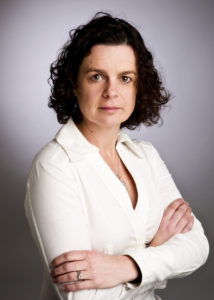Dr. Ashie Norris works as a group geneticist in Mowi. Mowi, previously known as Marine Harvest, operates in 14 countries and is the world’s largest salmon farming company with more than 14 500 employees. For Ashie, the company has been a place to work and develop professionally for 20 years.
Young horse enthusiastic from Ireland’s midlands thought that horse breeding could be her calling. She studied genetics in Trinity College in Dublin and did her master’s thesis of genetic evaluation of eventing horses. Soon after that she was hired to Horse Sport Ireland, the Irish sport horse federation. Why and how did she swift from terrestrial animals to aquatic ones?
 “I loved to work in the federation, but I felt like horse breeding was not as led by science as I would have wanted it to be – there are many different players involved and affecting the work. Soon after that I got an opportunity to do a PhD in genetics in Trinity College”, Ashie tells.
“I loved to work in the federation, but I felt like horse breeding was not as led by science as I would have wanted it to be – there are many different players involved and affecting the work. Soon after that I got an opportunity to do a PhD in genetics in Trinity College”, Ashie tells.
Her PhD was partly done for Hydro Seafood Ireland, the predecessor of Marine Harvest
“I knew nothing about fish. Grown up in midlands in a horse farm I thought I would never get interested in fish, but it was fascinating. Halfway through the PhD Hydro Seafood offered me a job and a possibility to finish my PhD there”, Ashie says. Nowadays Ashie is working with the operational breeding programs and in several research projects. Genomic selection is one of the tools she’s using and researching a lot. We asked couple of questions from Ashie about the topic.
For which purposes you see genomic selection to be implemented?
“Nowadays for every single one of the traits we have in salmon – it’s just a remarkable tool that makes the selection more efficient. It’s like putting on glasses instead of stumbling across the room. You might know where to go but you get bruised along the way if you can’t see well. In fish breeding with genomic selection you can see more clearly.”
How do you use it in Mowi?
“In Mowi we use a combination of genomic selection on a 50k array and marker assisted selection on a smaller set of SNPs. We balance these two depending on trait and stage in the life cycle of the fish. This project will help us to find the maximum efficiency in these approaches as well as to develop other solutions for intermediate numbers of SNPs.“
What is the impact of genomic selection for Mowi?
“We definitely get greater genetic gain; the impact is larger where we don’t have individual measurements. For example impact in growth is little, we might get 5 % of benefit, but for example in disease resistance the improvement might be 30%. The genetic gain is clearly related to economic aspects: it just makes the program more efficient.“
What is the benefit of genomic selection for the whole aquaculture sector in EU?
“I believe one of the greatest benefits is the ability to select for the disease resistance. It’s the biggest challenge for the whole industry. So for the ability to choose the most resistant individuals we need genomic selection – there’s no other way.”
What do you expect from AquaIMPACT as a project?
“This is very important project for nutrition and genetic improvement. Some improvement has of course been happening already but now it’s really taking a turn upwards because of the genomic selection. This is timely project also when it comes to nutrition and feeds. We have had this uncomfortable feeling for a while that how the feeds are keeping up with this all – and this project is really great to address that issue!”
